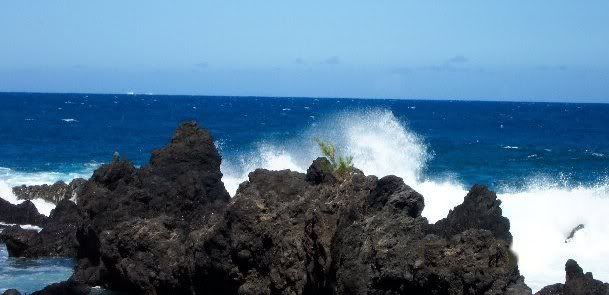April 13, 2004
Who Is The Merrie Monarch?
This week is little Hilo town's moment in the sun...
The 41st annual Merrie Monarch Hula Festival and celebration of all things Hawaiian. There will be nightly competitions and a parade at the end of the week. All are televised and if anyone is reading from Las Vegas, I think that one of the cable stations there is carrying it as well. The dancing is incredibly beautiful a thrill to watch.
But who is the "Merrie Monarch" and what is this all about any way...
David Laamea Kamanakapuu Mahinulani Naloiaehuokalani Lumialani Kalakaua, was born in 1838 in Honolulu, of chiefly rank. The Royal line was diminished, and he was a distant cousin of the Kamehameha line.
He attended the Royal School and had many careers, among others, in the militia, as a lawyer and as Hawaii`i's Postmaster General.
In 1874, at age 37, the Hawaiian Legislature elected him king. During his reign, he worked tirelessly to restore elements of Hawaii`i's culture banned by the British and American missionaries, such as the hula.
His fondest hope for Hawaiians was to "be restored to our former position of pride and power in our own land."
As a skilled diplomat, sportsman, author, historian, inventor and world traveler, Kalakaua's life was a mixture of Hawaiian and Western cultures.
Although Kalakaua often was attacked by other Hawaiians for cooperating with the powerful Americans, the Americans saw him as too nationalistic, anti-American, and unpredictable.
In 1887 a group of American and other white business leaders, backed by an armed militia they had founded, imposed on the king a new constitution that sharply limited his powers.
The so-called Bayonet Constitution also placed new conditions on the right to vote, consolidating the influence of wealthy whites. It required that voters have a yearly income of $600 or own $3,000 in property, a rule that disenfranchised about three-fourths of the native Hawaiian voters. European and American males could vote, even if they were not Hawaiian citizens, but Asian immigrants were excluded.
Kalakaua ruled from 1874 to his death in 1891, and his sister, Queen Liliuokalani succeeded him. She was the last of the Hawaiian Monarchs to rule an independent Hawaii
His nickname of "Merrie Monarch" evolved from the many gala events he hosted at `Iolani Palace.
King David Kalakaua's coronation ceremony was aan important milestone in the revival of the culture of the Native Hawaiians. It was held in a specially constructed pavilion on the grounds of Iolani Palace in Honolulu on a bright and sunny February 12, 1883.
Kalakaua's coronation remained Hawaiian at heart, when proud and graceful dancers stepped forward to begin the hula nemanema, hula olepelepe and hula Palani pa'i umauma.
King David Kalakaua's long reign of seventeen years was marked by a joyful resurgence in Hawaiian culture, including some of the very first public performances of Hula in defiance of oppressive missionary rules.
Because of his enthusiastic patronage of music and dance, Kalakaua earned a special nickname.
One hundred and sixteen years later, Hawaii, and the world - celebrates the memory of the 'Merrie Monarch' at the prestigious hula competition that bears his name. King David is honored as a Godly man that while he was having a good time he never forgot that he was king and that he had duties and responsibilities as well as priviledges. As the dancers perform in honor of his memory this week, and we enjoy the celebration, let us all remember that we to have the responsibility to pass on our history to our children, and not to forget the past as we press on towards the future.
